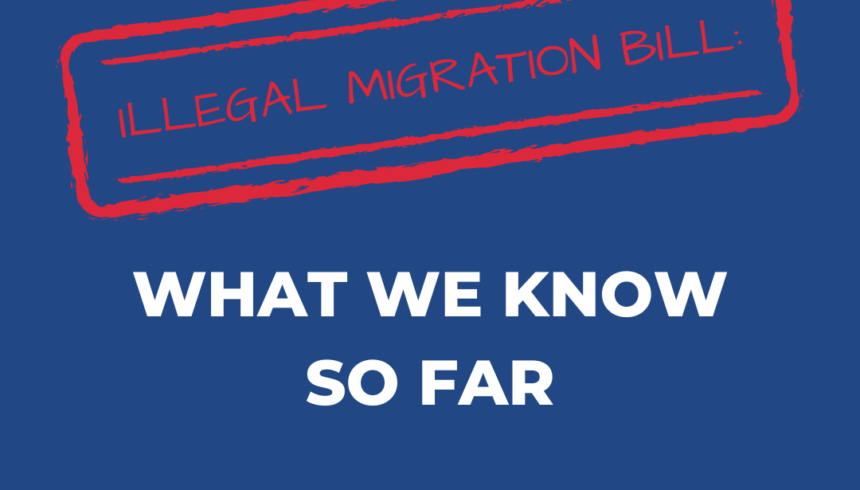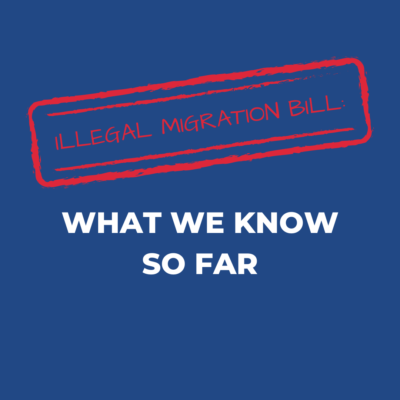Today, the Home Secretary made a statement introducing the government’s proposed “Illegal Migration” Bill. The purported aim of the bill is to stop small boats arrivals and keep the Prime Minister’s promise that “anyone entering this country illegally will be detained and swiftly removed.” Clearly, this will be a cruel and inhumane piece of legislation aiming to further reduce access to protection and punish refugees for how they are able to travel. At its worst, it could amount to an attempt to dismantle the asylum system altogether. There is still much to learn because, as the Home Secretary herself admitted, her statement was relatively thin on detail, and some of what she said had already been made public.
What we do now know about the Bill is:
- Automatic Detention on arrival: People arriving informally would be automatically detained, not simply for initial processing, but for removal. The plan would be to detain them until they are removed, and there would be no opportunity to apply for bail for the first 28 days of detention.
- Default towards removal: the government will attempt to remove adults arriving informally in almost all cases, to either their country of origin, or a ‘safe third country’. The only legal basis for challenging removal will be risk of “serious and irreversible harm” in the country to which they would be removed.
- Fewer protections for modern slavery survivors: Modern slavery survivors who have arrived, perhaps been trafficked, into the UK informally will be removed with fewer safeguards than they currently are – it’s not yet clear what this means.
- Incompatibility with the European Convention of Human Rights?: The Home Secretary said that she couldn’t make “a definitive statement of compatibility with ECHR” and that the Bill would disapply section 3 of the Human Rights Act, which ensures compatibility of UK legislation with the ECHR.
- Asylum accommodation and / or detention in former military sites: The Home Secretary confirmed that more sites are being procured to accommodate or detain those arriving via small boats.
As will already be evident, this leaves a lot unclear, and points towards a lot of possibilities to look out for.
Here are some key questions we will be asking:
- How widely will the policy of automatic detention-for-removal apply?
The statement refers to “illegal arrivals”, which clearly is meant to include small boat arrivals and additionally informal arrivals via lorry, for example. It is less clear whether it could effect some people who arrive via plane, but have stopped in third countries en route. This is quite significant, in that the answer could determine whether we have an asylum system at all in this country.
- How will the government determine whether it is safe to remove someone to their own country of origin?
The Home Secretary said people would be removed to their own country of origin “if safe”. In theory, this sounds a lot like the law around asylum for ages – if someone’s asylum claim is refused outright, meaning they are considered by the government not to be a refugee under the 1951 Convention or need humanitarian protection on another basis, the government tries to remove them. This suggests that the new legislation could entail a significant departure from the current inadmissibility rules, brought in in January 2021, under which inadmissible asylum claims aren’t considered. In theory, it could require full asylum determination in order to decide whether someone is bound for their own country, or another. However, there is also the very real risk that this does not take place, and instead people are routinely removed to danger in their own countries – that is, there is a serious risk of refoulement.
- How will the government remove people to third countries?
It is only possible to remove people to countries that agree to take them, and the government has not procured agreement from other European countries. It’s only option is Rwanda, with whom the UK government has a memorandum of understanding, but the plan to send people there is proving difficult to enact and would anyway only involve a relatively small number of people.
- What happens to people once they are released from detention?
By saying people won’t be able to apply for bail for 28 days, the Home Secretary tacitly acknowledged that some would be released. Will they then be eligible for asylum accommodation? Or will they be left destitute?
- Will the new military sites being procured operate as asylum accommodation, like Napier, or as detention?
In the former case, though the experience of living there is likely to feel constricting, people could come and go, in which case this doesn’t exactly fit within the plan of automatic, widespread detention. It might be an answer to the previous question, about where people will go when released from detention. Given how traumatic people find Napier to be, this in itself is worrying. This is all happening alongside the growth of ‘quasi-detention’ and detention in increasingly unclear circumstances.
- Exactly what will the new legislation say about the ECHR?
That is, as noted, very unclear.In practice, if enacted, this legislation is very likely to lead to many people trapped in limbo here, unremovable, but also with no route to gain recognition as refugees in the UK or otherwise regularise their status. It is very troubling.We will continue to stand in solidarity with refugees and demand an end to this attack on the very principle of asylum, and call for a just and humane asylum process.
Stand with JRS UK in calling for a just and humane asylum system?



